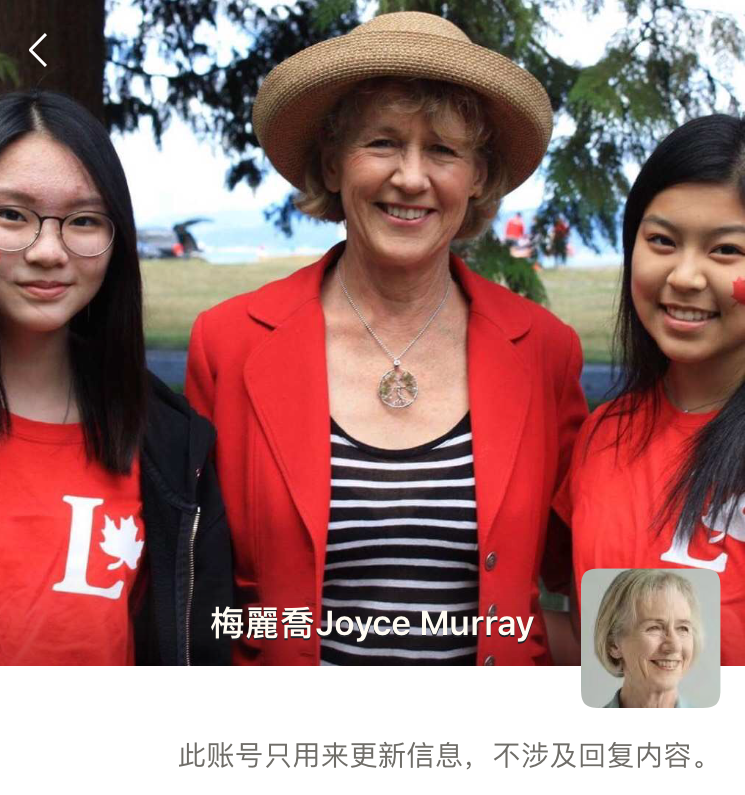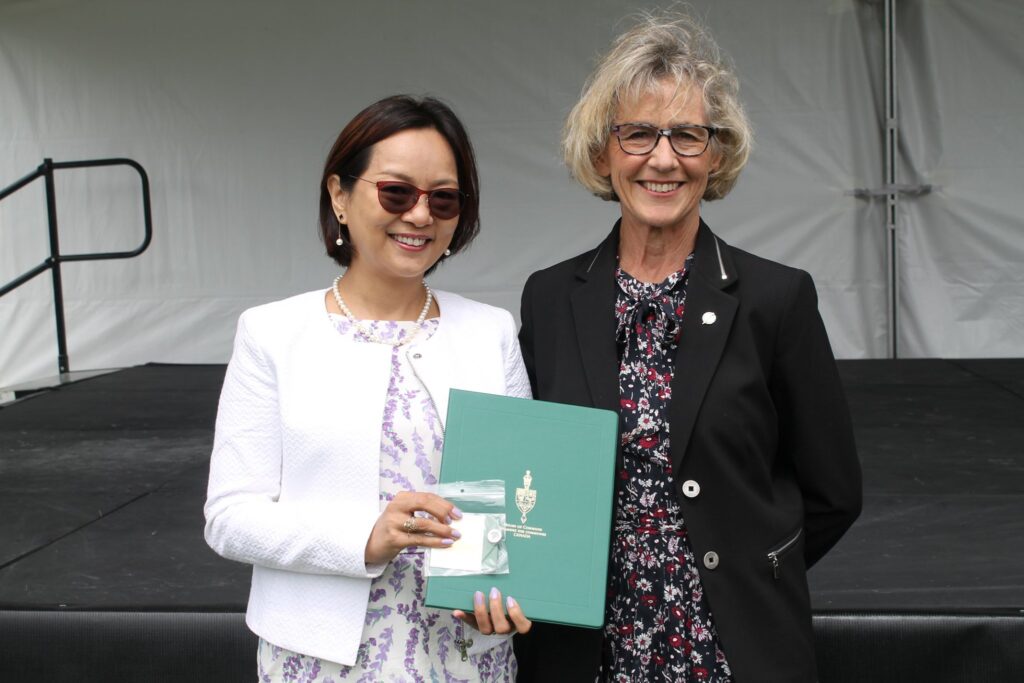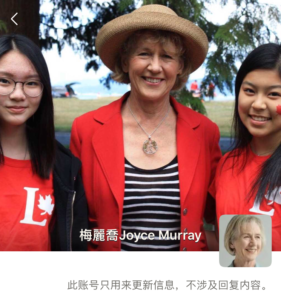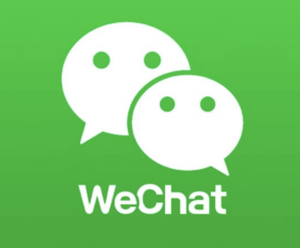
Bob Mackin
Staff of a Liberal cabinet minister are phasing out the use of a controversial Chinese state-monitored social media app on which they promoted government and party activities.

Ying Zhou (left) coordinated MP Joyce Murray’s WeChat group (Joyce Murray/Facebook)
On May 5, users of the WeChat group for Vancouver-Quadra MP Joyce Murray, the Minister of Fisheries, Oceans and the Coast Guard, were greeted with a notice in English that said: “We have some news to share! As things in our office change, we will be using our WeChat channel — MP Joyce Murray Information Group — less and posting minimally on this platform.”
The message, signed “Team Joyce Murray,” said the office would continue to provide Chinese-language services to constituents.
On May 8, after the Liberal Party’s weekend convention in Ottawa, administrator Ying Zhou removed users from the channel on which she had frequently published Chinese translations of government announcements and Murray’s activities inside and outside the riding. The audience included users in both Canada and China.
Murray was the Minister of Digital Government in Prime Minister Justin Trudeau’s cabinet from March 2019 to October 2021. She did not respond to an interview request. Contacted by a reporter, Zhou said: “I cannot answer your question,” before she abruptly ended the call.
Amanda Oliveira, Murray’s chief of staff, was similarly blunt.
“We have no further comments on that,” said Oliveira, who repeated the line when asked if national security factored in the decision.
Zhou’s note on the WeChat group came the day after Foreign Affairs Minister Melanie Joly announced she had summoned Chinese ambassador Cong Peiwu over a diplomat’s 2021 threat against Conservative MP Michael Chong and his relatives, which was revealed earlier in the week by the Globe and Mail. On May 8, Joly expelled Zhao Wei. China retaliated a day later by ordering Jennifer Lynn Lalonde to leave Canada’s consulate in Shanghai.

Joyce Murray, the Trudeau Liberals’ minister of digital government (WeChat)
Almost three years ago, a Liberal Party supporter’s use of Murray’s WeChat group to promote a lawsuit against a journalist sparked debate in the House of Commons.
Maria Xu, a former honorary chair of the pro-Beijing Canadian Alliance of Chinese Associations, posted a notice about the Maple Leafs Anti-Racism Actions Association (MLARA) and a QR code to make donations for a potential class action lawsuit against Global News. In Question Period, Murray said the WeChat group was an important part of community outreach, but she did not share Xu’s views.
“We do periodically post the disclaimer and rules of engagement,” said then-parliamentary assistant Jonathan Chiu. “Neither the Minister, nor any member of our team played any role in the fundraising. The WeChat account is not operated on a government device, it is run on a staff member’s personal device.”
Xu and members of MLARA were offended by an April 2020 story about how supporters of the Chinese Communist Party in Canada, Australia and other countries went on a six-week, worldwide personal protective equipment buying spree and exported 2.5 billion masks, gloves and other items to China early in the pandemic. MLARA co-founder Ivan Pak said last year that they raised $15,000. No lawsuit was filed.
At the end of February, Treasury Board President Mona Fortier banned the use of the Chinese-owned video app TikTok from government devices due to privacy and national security concerns.
However, only WeChat was mentioned in the body of the Communications Security Establishment’s 2023-2024 National Cyber Threat Assessment, which called the threat posed by China the “most significant by volume, capability, and assessed intent.”

WeChat/Tencent
“Online foreign influence activity very likely also targets linguistic minorities and diaspora communities in Canada. State-sponsored cyber threat actors aim to influence these groups in order to minimize dissent or support the policies of their country of origin,” said the report by the Canadian Centre for Cyber Security. “These groups often interact on platforms that are semi-closed and censored according to restrictive content regulations, meaning that misinformation, disinformation and malinformation [MDM] can very likely spread more easily throughout these groups. For example, WeChat, a social media app from China used by billions around the world, has been used to spread MDM and propaganda specific to the Chinese diaspora.”
Benjamin Fung, a professor in the School of Information Studies at McGill University, said Chinese-speaking immigrants to Canada “basically go back to China” when they pick up a smartphone and open WeChat. They feel like they are in a “comfort zone” when they scroll for celebrity or entertainment news.
Sometimes, however, the Chinese government or a state-sponsored organization will input disinformation to promote a candidate or an idea, as happened during the 2021 federal election defeat of Conservative MP Kenny Chiu, the Steveston-Richmond East backer of a foreign agents’ registry.
Support theBreaker.news for as low as $2 a month on Patreon. Find out how. Click here.











